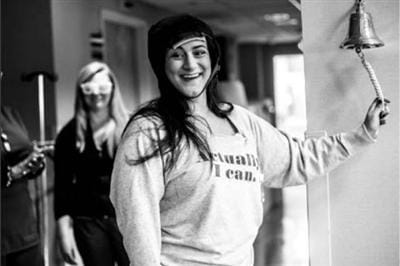‘Exceptional’ breast cancer care at Main Line Health

Colletti saw her Main Line Health nurse practitioner, Melanie Winter, CRNP, who referred her for a mammogram and an ultrasound. After testing, she met with Mary Beth Merola, RN, BS, CBCN, a nurse navigator at Lankenau Medical Center, part of Main Line Health.
“Mary Beth sat me down and said they were unsure whether the mass was cancerous. They were speeding up my appointment with the breast surgeon,” Colletti recalls. The breast surgeon, Jennifer Sabol, MD, also the director of the Comprehensive Breast Center at Lankenau, performed a biopsy. Colletti soon learned she had breast cancer.
Exploring every option
Colletti’s journey highlights the importance of having a multidisciplinary breast cancer care team that tailors treatment to each individual. In the weeks ahead, as testing gave her doctors more information, new challenges—and new options—emerged. Colletti’s Main Line Health medical team, consisting of Dr. Sabol along with oncologist Zonera Ali, MD, and plastic surgeon R. Brannon Claytor, MD, worked collaboratively to explore every possibility.
“Breast cancer’s actually a hundred different diseases all under the same name. Each needs to be treated differently, based on each person’s unique disease process.”
“Breast cancer’s actually a hundred different diseases all under the same name. Each needs to be treated differently, based on each person’s unique disease process,” Dr. Sabol says. “Patients need physicians who see the big picture, who take the time to get to know them and understand which treatment will provide the best outcome—because it can be overwhelming. Patients may not be thinking about how today’s decisions might affect them in the future.”
A creative surgical solution
A physical exam and ultrasound suggested Colletti’s tumor was large, which meant she would probably need a mastectomy. When an MRI showed the tumor was actually much smaller, there was hope she might instead be a candidate for breast-conserving surgery, called a lumpectomy. Then the picture changed again. Genetic testing showed that Colletti had a mutation in the BRCA1 gene, raising her risk for developing a second primary breast cancer. At that point, Dr. Sabol recognized that a prophylactic bilateral mastectomy was the smartest long-term approach.
“The bilateral mastectomy was important,” Dr. Sabol says, “but Anastasia was hoping to minimize her scarring and preserve as much of her natural self as possible. Preserving her nipples was very symbolic to her.”
It would also be a challenge. A large-breasted woman, Colletti was not a good candidate for a nipple-sparing mastectomy.
“The breast implants that would have been required during reconstruction would have been too large,” adds Dr. Claytor, the plastic surgeon. “It wouldn’t have been possible to correctly position the nipples and ensure an adequate blood supply.”
Together, Drs. Claytor and Sabol came up with a creative solution: To enable her to preserve her nipples, they would perform Colletti’s surgery in stages. The first stage took place in November 2018. Dr. Sabol removed the breast tumor with a lumpectomy, and Dr. Claytor performed a reduction in both of Colletti’s breasts, shaping them and placing the nipples in their proper position. The next stages of surgery would involve the nipple-sparing mastectomy and breast reconstruction, now with smaller implants.
“Breast reconstruction has dramatically evolved over the past 15 years,” Dr. Claytor explains. “We’ve increased our understanding of how tissue can be moved to help maintain the most essential part of the breast, the nipple. By reconciling the patient’s goals with the limitations we have, based on the disease, we can custom-design a surgical plan.”
Empowered during treatment

Wearing cold caps enabled Colletti to keep most of her long, thick locks all through treatment. The cold cap system is available at Lankenau Medical Center.
“We’ve come a long way in treating chemotherapy side effects, like nausea, but until recently, there hasn’t been as much focus on preventing hair loss, which is a major side effect both physically and emotionally,” Dr. Ali says. “People look in the mirror and are reminded every day that they’re getting chemotherapy. The goal is to empower our patients as much as possible.”
‘My second family’
In May 2019, Drs. Sabol and Claytor teamed up again at Bryn Mawr Hospital to perform Colletti’s bilateral mastectomy. She is scheduled for one more surgery to receive her breast implants.
“I love every single one of my doctors,” Colletti says. “My team became my second family. I could text my doctors at any time of the day; when I was scared or had questions, they always answered me in a reassuring way.
“They came together to support me, to talk things through so I understood them. My care at Main Line Health was exceptional.”
A simple, lifesaving test
Early detection of breast cancer with screening mammography can save lives. Contact Main Line Health today and our health care team will help schedule your mammogram at one of our nine convenient locations. Call 484.580.1800 or schedule your mammography appointment online.
Main Line Health serves patients at hospitals and health centers throughout the western suburbs of Philadelphia. To schedule an appointment with a specialist at Main Line Health, call 1.866.CALL.MLH (225.5654) or use our secure online appointment request form.